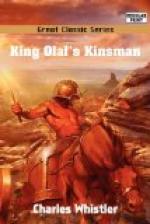“What of Cnut, Swein’s son?” asked Eadmund.
“He is but a boy. What he may be in a few years’ time I know not. With him it will be as with myself. I was given a ship when I was twelve years old, and thereafter all that my men did goes to my credit in the mouths of the scalds. Yet my men and I know well that Rani, my foster father, whom you will soon know, was the real captain and leader for the first three or four years.”
Then said Eadmund:
“Cnut is of no account.”
Olaf laughed a little, and answered:
“Cnut’s own arm may be of little strength, but his name is on the lips of every Dane. There are three chiefs who will hold the kingdom in his name, and they are the men whom you must meet: Thorkel the High, his foster father; Ulf Sprakalegsson the jarl, his brother-in-law; and Eirik the jarl, whose brother Homing holds London even now. Good men and loyal they are, and what they do Cnut does.”
“I have three chiefs in my mind who can match these,” said our atheling. “Olaf the king, and Ulfkytel of East Anglia, and Edric Streone, my foster father.”
Then Olaf looked in the face of Eadmund, as it seemed to me in surprise, and made no answer.
“Are we not equal then?” asked the atheling.
“I have heard that Edric Streone is on the Danish side,” said Olaf. “Cannot Utred of Northumbria be trusted?”
“Edric has but sought rest, from need,” answered Eadmund. “I know not what else he could do at last. He will join us again as soon as we land. So also will Utred.”
“Then we are equal,” said the king, while a cloud seemed to pass from his face, for Streone led all Mercia, and were he in truth on our side things would go well. It was no very secret talk among some of us that Edric the earl had made peace sooner than might have been, but that angered Eadmund and the king sorely if so much were even hinted.
“Then you will indeed help us?” said Eadmund, for Olaf had accepted the place he had named for him as it were.
“I have a debt to England that I can never repay,” answered the king gravely. “She gave us our first teachers in the Christian faith. And Swein has held Norway, my own land, with the help of the heathen jarls who are yet there. I fight the fight of the Cross, therefore, and when I go back to my own land, it will be to sweep away the last worship of Odin and Thor. But the time has not come yet,” and his eyes shone strangely.
“When it comes I will help you,” said Eadmund, “if it may he that I can do so.”
“I know it, and I thank you; but it is my thought that I shall need no help,” said the king, while the look on his face was very wondrous, so that I had never seen the like. It minded me of the pictures of St. Stephen that I saw in a great church here with Abbot Elfric and Eadward. Then he spoke of the spread of the Faith in Norway, and how that he would be the one who should finish what Olaf Tryggvesson, his cousin, had begun; and one might see that he longed for power and kingship only for that work.




